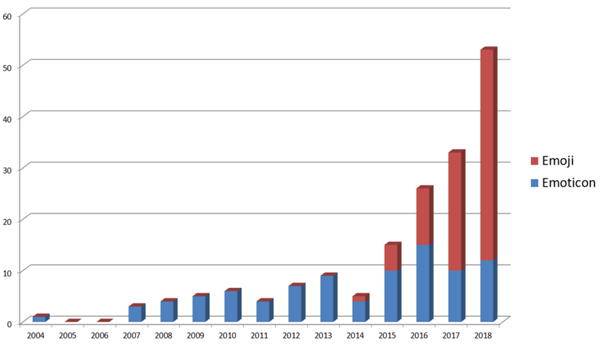CNN reported last month that emojis and emoticons are increasingly being discussed in U.S. court cases. Attorneys are attempting to interpret what a specific emoji means and the courts are struggling to handle the nuances of emojis as evidence.
Eric Goldman in his Technology & Marketing Law Blog found that the number of emoji/emoticon case references is growing rapidly. Ukwuachu v. The State of Texas, 2018 WL 2711167, defines the difference between emojis and emoticons—emoticons are a combination of typed keyboard characters that are used to represent a stylized face conveying the writer's tone. Emojis can be an emoticon or an image meant to convey a writer’s tone.
Goldman counts 53 cases in 2018 that included references to emojis/emoticons. This compares to 33 in 2017. By his count, there has been a total of 171 cases through 2018, over 30% of which were in 2018.

At least 50 cases mention emojis/emoticons so far in 2019.
Why is this important?
Emojis can contribute to misinterpretations and misunderstandings. There are currently no court guidelines for how judges should handle or interpret them. Issues in emoji evidence are most prevalent in sexual harassment and criminal cases, and are increasingly involved in workplace lawsuits as well.
Emojis cannot be considered a “universal language.” There are more than 2,823 emojis set by the Unicode Consortium. These range from facial expressions, weather, food, activities, and hand gestures. To complicate matters for the courts, and as noted by researchers from the University of Minnesota, emojis look different depending on the platform used.

There are also cultural differences in how an emoji is interpreted. The thumbs-up gesture is usually seen as positive in the U.S., but as offensive or vulgar in the Middle East, and in China, a smiley face emoji is often taken as sarcasm.
Cases involving emojis are going to get even more complicated as the technology advances. Currently, emojis are static, but increasingly, they can be animated. Apple’s animojis or 3D emojis animate the sender’s facial movements by scanning the user’s facial expressions and mapping them onto the emoji so it can act out behavior. Samsung’s AR emojis actually creates a likeness of the user’s face, which can then be shared via messaging apps.
